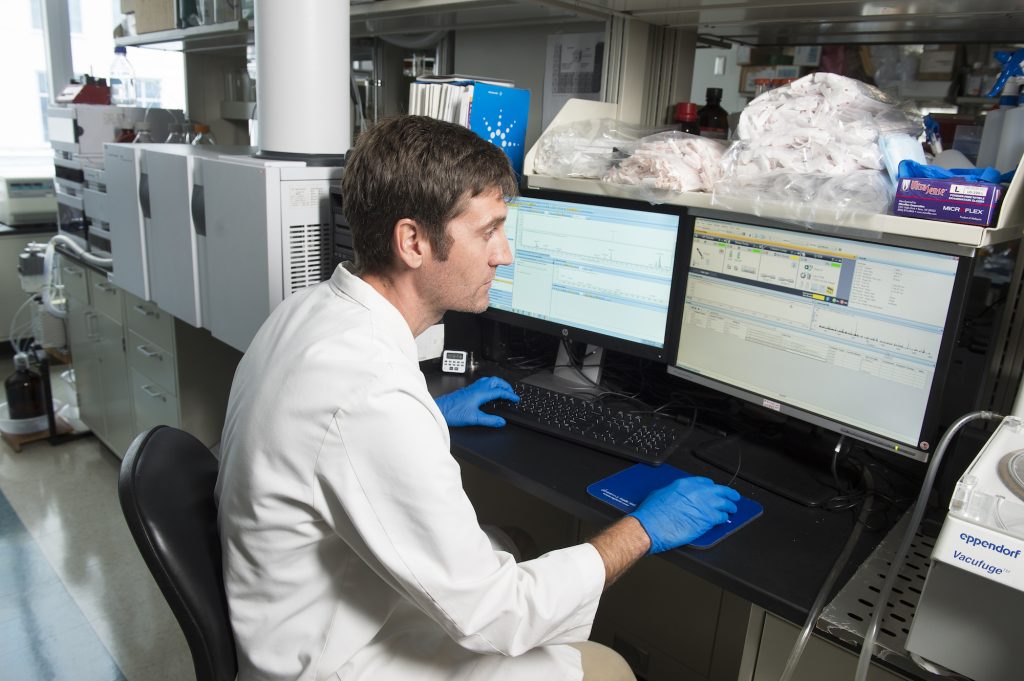Glutamate carboxypeptidase II (GCPII) is a 94 kD class II membrane bound zinc metalloenzyme which catalyzes the hydrolysis of the abundant neuropeptide N-acetylaspartylglutamate (NAAG) to glutamate. GCPII is a well-established therapeutic target in neurological diseases wherein excess glutamate is presumed pathogenic1, such as stroke, traumatic brain injury, amyotrophic lateral sclerosis (ALS), epilepsy, neuropathic pain, chemotherapy-induced neuropathy, schizophrenia, and cognition in multiple sclerosis2. While known GCPII inhibitors are potent and selective, they suffer poor physicochemical properties, are ionized at physiological pH, and lack oral bioavailability and brain penetration3, necessitating large peripheral doses or direct brain injection to exhibit efficacy. Our laboratory has recently developed novel prodrugs of GCPII inhibitors4 that cover their charged functional groups resulting in enhanced oral bioavailability and tissue penetration in both rodents and dogs.
In addition to neurological disorders, recent genomic, clinical, and pharmacological data implicate GCPII (also known as Prostate Specific Membrane Antigen; PSMA), in the etiology of inflammatory bowel disease (IBD).5 We have demonstrated robust 300-1,000% increase in GCPII activity in the intestinal mucosa of patients with active IBD, and inhibitors delivered systemically ameliorate IBD symptoms in several well validated preclinical models. 6-7 Currently, we have partnered with the Crohn’s and Colitis Foundation to develop orally available GCPII inhibitors in IBD models. Patent applications covering broad use and composition of matter claiming GCPII inhibition as novel therapeutic approach for IBD have been awarded. In a parallel effort, in collaboration with Eisai Pharmaceuticals, we completed the high throughput screening (HTS) campaign of their large diverse chemical library using a novel DNA-linked Inhibitor Antibody Assay (DIANA)8 to identify novel chemotypes that inhibit GCPII at its putative allosteric sites; current SAR of the hits are ongoing. Our laboratory has over two decades of experience in GCPII inhibitor design and characterization, with 100+ manuscripts and 30+ patents.
REFERENCES
- Vornov JJ, Hollinger KR, Jackson PF, Wozniak KM, Farah MH, Majer P, Rais R, Slusher BS. “Still NAAG’ing After All These Years: The Continuing Pursuit of GCPII Inhibitors.” Adv Pharmacol 2016, 76, 215-55 [PubMed]
- Barinka C, Rojas C, Slusher BS, Pomper M. “Glutamate carboxypeptidase II in diagnosis and treatment of neurologic disorders and prostate cancer.” Curr Med Chem 2012, 19 (6), 856-70 [PubMed]
- Rais R, Rojas C, Wozniak K, Wu Y, Zhao M, Tsukamoto T, Rudek MA, Slusher BS. “Bioanalytical method for evaluating the pharmacokinetics of the GCP-II inhibitor 2-phosphonomethyl pentanedioic acid (2-PMPA).” Journal of pharmaceutical and biomedical analysis, 2014, 88, 162-9 [PubMed]
- Majer P, Jancarik A, Krecmerova M, Tichy T, Tenora L, Wozniak K, Wu Y, Pommier E, Ferraris D, Rais R, Slusher BS. “Discovery of Orally Available Prodrugs of the Glutamate Carboxypeptidase II (GCPII) Inhibitor 2-Phosphonomethylpentanedioic Acid (2-PMPA).” J Med Chem, 2016, 59 (6), 2810-9 [PubMed]
- Zhang T, Song B, Zhu W, Xu X, Gong QQ, Morando C, Dassopoulos T, Newberry RD, Hunt SR, Li E. “An ileal Crohn’s disease gene signature based on whole human genome expression profiles of disease unaffected ileal mucosal biopsies.” PLoS One, 2012, 7 (5) [PubMed]
- Rais R, Jiang W, Zhai H, Wozniak KM, Stathis M, Hollinger KR, Thomas AG, Rojas C, Vornov JJ, Marohn M, Li X, Slusher BS. “FOLH1/GCPII is elevated in IBD patients, and its inhibition ameliorates murine IBD abnormalities.” JCI Insight, 2016, 1 (12) [PubMed]
- Date AA, Rais R, Babu T, Ortiz J, Kanvinde P, Thomas AG, Zimmermann SC, Gadiano AJ, Halpert G, Slusher BS, Ensign LM. “Local enema treatment to inhibit FOLH1/GCPII as a novel therapy for inflammatory bowel disease.” J Control Release, 2017, Oct 10;263:132-138 [PubMed]
- Navratil V, Schimer J, Tykvart J, Knedlik T, Vik V, Majer P, Konvalinka J and Sacha P. “DNA-linked Inhibitor Antibody Assay (DIANA) for sensitive and selective enzyme detection and inhibitor screening.” Nucleic Acids Res, 2017, Jan. 25;45(2) [PubMed]


